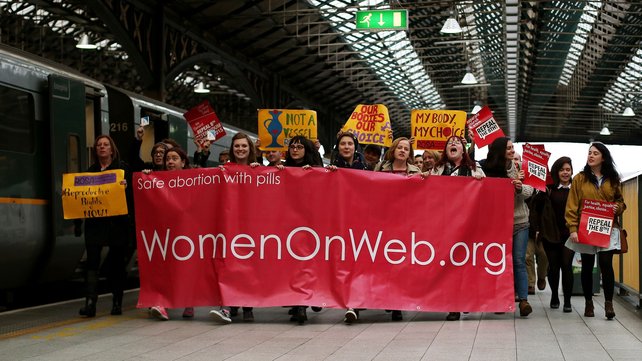In the last number of years there has been a significant shift in the attitudes of people in the South towards the issue of abortion, particularly in the aftermath of the tragic death of Savita Halappanavar, in late October 2012. There is growing pressure on the political establishment to repeal the 8th Amendment to the constitution that was inserted 1983. APRILLE SCULLY examines how the battle for a woman’s right to choose can be won.
The May referendum saw a 62% Yes vote for marriage equality representing a huge victory for the LGBTQ community after years of campaigning. The scale of the Yes vote demonstrated how decisively attitudes had changed in Ireland, a country where homosexuality was criminalised until 1993. It was a vote to recognise and affirm LGBTQ people, and it was also a vote for progress and social change.
It was, as the Rubberbandits said, “Ireland turning its back on the Catholic Church”. In previous referendums – on issues such as divorce for example – there was a major divide between Dublin and the rest of the country. But in the marriage equality referendum all but one constituency voted Yes. This huge Yes vote has now brought the question of Ireland’s ban on abortion into focus.
Since Fine Gael and Labour came to power in 2011 they have twice voted down bills to hold a referendum to repeal the 8th amendment with pathetic attempts to justify their inaction. Aodhan O’Riordan, TD for the Labour Party, said in response to the 10,000 strong March for Choice held this September that he believed a referendum on repealing the 8th amendment “would be trounced”. This is despite several polls stating a majority wants a repeal of the 8th amendment and two thirds of the population support a complete decriminalisation of abortion.[i]
Catholic Ireland
On the foundation of the Irish State, the Irish capitalist class was weak. It leant on the Catholic Church for both ideological support and the provision of health and education and other services. Abortion had never been legal in Ireland. The passing of the 1967 Abortion Act that legalised abortion in the United Kingdom (excluding Northern Ireland) showed the backwardness of the the Republic where access to contraception was illegal (it would not be legalised until 1980). Homosexuality would remain a criminal offence until 1993.
Women were deeply oppressed in this religious society. 20th century Ireland had Magdalene laundries, mother and baby Homes and widespread practice of symphysiotomy as well as a contraception and abortion ban. Women’s sexuality was scrutinised and any deviation outside of Catholic teaching was punished with institutionalisation and social alienation. In 1981 the powerful Catholic right secured pre-election promises from both Fianna Fáil and Fine Gael to amend the constitution to ensure that abortion could not be introduced either by legislation or by the courts in the Pro-Life Amendment Campaign (PLAC). The move came in the wake of Roe vs. Wade verdict in the US Supreme Court that legalised abortion.
There was a genuine fear by the Catholic right in Ireland that a movement could achieve the same thing here and so they demanded a Constitutional provision prohibiting abortion. One Anti-Amendment campaigner said: “they [the Catholic right] could see the writing on the wall with the way things were going and I mean the way they did it was actually quite shrewd. They initially got the commitment from Fine Gael and Garret Fitzgerald … Fianna Fáil of course had a totally reactionary position on it but they weren’t actually intending to jump on the anti-choice bandwagon but when Fine Gael did it, Fianna Fáil panicked and decided okay, we’d better go for it as well.”[ii]
This is significant. There was a growing radicalisation on these issues globally. The role of the Catholic Church in Ireland had meant religious doctrine had stunted or delayed the backlash to sexual repression but a movement against it was inevitable.
Misogyny
John O’Reilly, secretary of the Pro Life Campaign regarded a successful anti-abortion amendment as a prelude to action against contraception, sex outside of marriage, sex education in schools and homosexuality. “The campaign for a pro life amendment would […] serve to halt the permissive tide in other areas”. “Pro-life” meant anti-abortion and anti anything that conflicted with Catholic teachings. It meant preserving the nuclear family and the traditional role of the woman within those confines.
The denial of abortion rights is misogynistic. It is a condemnation of women who have sex for pleasure. If a woman becomes pregnant accidentally and the state forces that pregnancy on her unwillingly it is torture. Abortion bans derive ultimately from the idea that women’s role in society is being a vessel for childbirth and imply that she is not an autonomous individual who should have the ability to make her own reproductive choices as she sees fit.
Ireland is the only “democratic” country in the world to have a constitutional ban on abortion. Amnesty International and the UN Human Rights Committee have called on Ireland to bring their abortion laws in line with its international human rights obligations – how in 2015 has this been allowed to happen?
Exporting Abortion to Britain
The proximity of Britain as a “safety valve” where women could travel to access an abortion has alleviated a lot of the pressure on successive governments. The X Case in 1992 saw an explosion of anger from below in protest of the barbaric treatment of a 14 year old girl by the state. Pregnant as a result of rape, the girl wanted to travel to the UK for an abortion but an injunction was sought from the High Court, who declared the life of the unborn could not be interfered with and the teenager had to be restrained from leaving Ireland for a period of nine months.
10,000 people took to the street calling “for a woman’s right to choose” in response to the High Court’s verdict. Faced with mounting anger, the Supreme Court over-ruled the decision on the basis that the 14 year old was suicidal. The implications of this ruling meant the amendment had been opened to be interpreted to allowing abortions in limited circumstances, if there was a threat to the life of the mother including the threat of suicide. The abortion situation was in a tailspin. The Fianna Fáil government responded with a series of referenda to pour cement into the hole that had blown open, attempting to remove by referendum the risk of suicide as grounds for a termination. In its propaganda before the referendum FF said: “accepting a risk of suicide as a ground for termination would carry the danger of opening the way to wide-scale abortion.”[iii]
The referendum was decisively rejected with 65.4% electorate voting against removing the risk of suicide as grounds for abortion. The other referendums on the right to freedom of travel with respect to abortion and the right to information on abortion services passed, which is what the government wanted, highlighting its utter hypocrisy. The three results were the opposite to what the pro life lobby wanted and marked a turning point in the influence of the Catholic right losing over the masses. However, the Fianna Fáil / Labour government which emerged from the general election did not enact the legislation relating to either the X case or the referendum results. This inaction was repeated by the proceeding Fine Gael/Labour (1994-97) and the Fianna Fáil coalitions (1997-2011).
Savita Halappanavar
The 1990s marked a period of social change within Ireland. Legislative change included the decriminalisation of homosexuality and the legalisation of divorce. The Celtic Tiger saw the working class double in size as Ireland became more urbanised and cities grew. Unlike previous decades, young people weren’t forced to emigrate. People’s aspirations for life grew as economic growth soared. The social consciousness of the masses pushed much further ahead than the political establishment.
In October 2012 the tragic death of Savita Halappanavar caused a wave of public outcry that the Government couldn’t ignore. Savita was miscarrying but was refused a termination on the grounds that it was illegal. The words used by the nurse at the Galway Maternity Hospital when Savita repeatedly asked for an abortion were: “This is a Catholic country”. The foetus was only removed when its heartbeat stopped, but at this point the health of the mother had deteriorated so severely that she died soon after.
Savita was too ill to travel to the UK and died because she was refused a termination. This shocked huge sections of the population, in particular, women of reproductive age. Savita was a pregnant woman, when a crisis occurred her life was sacrificed because of the sanctity offered to the unborn by the constitution. When the news of her death broke, an impromptu protest was called that saw over 2,000 people take to the streets in sorrow and outrage that night and 20,000 people march in Dublin on the Saturday. Overnight anger exploded from below at the barbarity of the situation and the misogyny of the state was made overtly clear.
No progress without repeal
Because the UK exists as a safety valve, the struggle for abortion rights has been blunted in Ireland, with the issue out of sight and out of mind. A poll released by Amnesty earlier this year showed 64% of people didn’t know that it was a criminal offence to have an abortion when a woman’s life is not at risk. Only 9% knew the penalty was a 14 year prison sentence. While it is clear there has been a major transformation in Irish society there is a disconnect and a confusion amongst people’s attitudes and abortion. The pro life lobby have succeeded in keeping the topic discussed in an abstract, philosophical. Discourse in the Catholic schools and media panel shows centres around “when life begins” for the foetus rather than around the reality of what abortion means for women.
This is why when cases like Miss X and Savita Halappanavar come to public attention it has an explosive effect because at that time it becomes crystal clear that these are real women and that this ban is a danger to them. A conservative approach taken by some pro choice campaigners did not clarify the situation post Savita’s death. There was no clear demand to repeal the 8th amendment. The demands centered on immediate X Case legislation as well as a future granting of a referendum to repeal the 8th amendment. Often a Repeal of the 8th amendment was not mentioned at all.
ROSA (for Reproductive rights, against Oppression, Sexism and Austerity) was established by women members of the Socialist Party in February 2013. In its first publication from that month it stated:
“The slogan of demonstrations following Savita’s death was “Never Again”. But the reported legislation won’t guarantee this, unless it is broadened to allow abortion on the grounds of health. This requires Repeal of the 8th Amendment and must be campaigned for. […] We believe the prochoice movement should not tactically focus on X Case legislation first, then repeal at some stage in the distant future. The two could be done simultaneously and they are the minimum needed to defend women’s health.”
After the death of Savita it made no sense to argue to legislate for X and suggest that the outcome would be a situation where abortion rights would be available in any real way in Ireland. Clare Daly, TD, speaking Action on X Protest outside Dáil Eireann, 14th November 2012 said:
“When myself and deputies Mick Wallace and Joan Collins, with the support of the ULA, moved legislation [for the X case] earlier this year it was to precisely legislate for this situation. To give certainty, to ensure that the twenty year delay that this country had pontificated on would never happen again.”[iv]
It is not true to say Savita had died because the X case was not legislated for. Savita died because of the 8th amendment because at the moment the judgement was called that her life – and no longer ‘only’ her health – was in danger it was too late. As Ruth Coppinger TD, then Socialist Party councillor for Fingal County Council, said on the “Never Again” march in 17th November 2012:
“The X Case is absolutely not enough. Because it would not have guaranteed that Savita got the treatment she needed… Because what happens with the X Case? The life of the woman is pitted against her health. You would still have the case where doctors are having to gamble in this grey area…where does the health of the woman suddenly endanger her life? Are we saying there’s an acceptable threshold of pain, suffering and torture that women are put through before we deem their lives to be in danger? I don’t think that’s the mood of the people here or the people of this country… X is not enough, we need to go beyond it.”[v]
Nor was it necessary to curtail our demands in order not to alienate mass consciousness. With the death of Savita the public outcry was in regards to the risk to health of the woman – it was much broader than X legislation could give. Is it correct to say that in 2013 a woman impregnated as a result of rape, or a woman with cancer forced to leave Ireland for a termination to continue life saving chemotherapy would have gotten the support of broad layers of working class and middle class people? Attitudes had quietly been moving for years towards the majority supporting the decriminalisation of abortion – the tragedy of Savita sped up this process. Calling demonstrations with this limited demand based on where the mood was at twenty years ago led to a failure to maintain mass pressure.
To properly connect the political demands with the situation surrounding Savita’s death, the Socialist Party proposed a bill which included allowing abortion when the health of the woman is at risk. This would have gotten a lot more attention and it would have become a focal demand to call for a Repeal of the 8th amendment. The ULA could have played an important role in broadening out the debate beyond the narrow confines that the establishment tried to impose on it.
The support for abortion rights was much broader amongst Irish society and Clare Daly’s ULA bill for X legislation looked for less than what there was to be had. After Savita’s death it became obvious that the state would have to do something. It would have to at the very least implement legislation relating to the 1992 referendum. The pro choice movement could have poured pressure on winning the right to a referendum, pointing to the fact the X Case itself did not deal with the situation that caused Savita’s death and that the only way to guarantee the safety of pregnant women in Ireland was to delete the 8th amendment from our constitution. What we got instead of a referendum was the disastrous Protection of Life During Pregnancy Act, which criminalised women who accessed abortions in Ireland with a fourteen year prison sentence.
Effects of the PLDPA
The drastic effects of this legislation was shown a year later when Miss Y attempted to use the Protection of Life During Pregnancy Act and was subjected to torture by the state. Pregnant as a result of rape, Miss Y wanted to terminate that pregnancy but a panel of doctors deemed her not to be suicidal enough to qualify for an abortion.
Desperate, she fled to the UK but was denied entry because of her asylum seeker status. She went on hunger and thirst strike. Forcibly hydrated, she underwent a forced c-section at 24 weeks. Later that year, a brain dead woman was kept alive as an incubator because she was pregnant, against the wishes of her family.
What Now?
At the moment the political establishment is under pressure to hold a referendum to repeal the 8th amendment yet they will not embrace free, safe and legal abortion. On the 10th February 2015, a private member’s bill to allow women to seek terminations of pregnancy in cases where the foetus has no chance of survival, was defeated by 104 votes to 20. This is in contrast to 80% of the population supporting abortion in the cases outlined in the bill. Obviously, parties like Fine Gael and Fianna Fáil would rather ignore this issue and make women to continue to travel. But similarly, other so-called “progressive” parties of the Dáil such as the Labour Party and Sinn Fein are way behind the desires of the public.
The Labour Party voted against the Fatal Foetal Abnormality (FFA) bill. It has capitulated on every anti-cut promise since coming to power. Despite holding the office of education it has completely bowed to Catholic influence in schools. The Labour Party has now voted against holding a referendum to repeal the 8th amendment three times since 2011. The legislation Labour voted on to replace the 8th at their national conference would mean, according to the Labour Women Chair, Sinead Ahern, who proposed it, that “our abortion laws would remain the most restrictive in Europe.” Labour is utterly opportunistic and certainly not pro choice.
Sinn Fein abstained on the vote to allow for abortions in the case of Fatal Foetal Abnormalities (FFA) because they “had not discussed their position”. Sinn Fein’s stance in Northern Ireland is pro life. But in the south they are under pressure, pushing them to support, at their national conference, a repeal of the 8th amendment with abortion to be legislated for in restrictive cases such as FFA. A fuller pro choice position was voted down.
None of the major parties support a woman’s right to choose. However, just like in the US – when abortion rights were won under avowed pro life president Richard Nixon – we too can win reproductive rights under the reactionary Irish state. Crucially we must be clear in our demands. We must not let the political establishment curtail them as happened after the death of Savita. The chief danger is an “amendment to the amendment”, ie replacing the 8th in the constitution with wording to allow for cases such as FFA. This is unacceptable. there should be no provisions in the constitution for controlling women’s bodies.
There is almost universal public support for abortion rights for women in the “hard cases”. That is, cases such as rape, incest, and FFA. The reality of 177,000 women leaving the country to access abortion services since the 1970s is a vast number and a nameless face. It is welcome when famous faces like Róisín Ingle and Tara Fylnn “come out” with their abortion story.
The battle to win contraceptive rights is a movement we can take lessons from. This movement implemented actions like the 1971 Contraceptive Train where a group of activists brought back condoms and the contraceptive pill. The tactic was to deliberately flout the law and in that way directly challenge the state to prosecute.
In 2014 ROSA recreated the action with the Abortion Pill Train. On arriving at the station the activists held the pills aloft and told the watching media that they were in possession with a stash of pills and that anyone seeking a termination under nine weeks should contact WomenOnWeb.org to avail of the safe abortion pills.
This action, and the even more audacious Abortion Pill Bus organised by ROSA and Ruth Coppinger TD in October 2015, succeeded in calling bluff on the state’s unwillingness to prosecute the activists breaking the law – proof that the medieval ban is unworkable. But also it has publicised the availability of safe, illegal abortions in Ireland with pills on a public platform not seen before. These actions have succeeded in forcing the debate outside the confines of rape / incest / FFA. It forces the debate onto the reality that everyday women are leaving the country or ordering illegal abortion pills in order to exercise bodily autonomy.
Separate church and state
A victory in the struggle to repeal the 8th amendment would be historic. This struggle needs to flow into a broader social struggle to fully separate church and state. It needs also to flow into a struggle for a properly funded secular public health service that’s free at the point of delivery, in which abortion will be provided for free, as well as all healthcare services including mental health services and healthcare for the transgender community. Part of such a social movement must be the struggle for a left government. No party of the establishment, nor Sinn Fein, is willing to take on the prestigious position of the Catholic Church in health and education.
A left government would put this quest centre stage. Furthermore no public health service will be developed unless we break the logic of the markets, of austerity, and of the capitalist rule of the 1%. The struggle for women’s equality and liberation must be tied up with a mass working class socialist challenge to capitalism in Ireland and globally. Such a struggle must have women and all the oppressed playing a vital role.
[i] Poll for Amnesty International, carried out by Red C, published 08/07/15
[ii] 20th Century Social Perspectives, Issue 2, March/April 2013, Volume 21
[iii] The Referendums on The Right to Life, Travel and Information: Key Questions and Answers. Available at http://lenus.ie/hse/handle/10147/248633?locale=ga
[iv] “Clare Daly Speaks at ACTION ON X Protest, Dáil Eireann, 14th November 2012”, https://www.youtube.com/watch?v=u8SwwLzZAr4
[v] “Cllr Ruth Coppinger speaking at Never Again: March for Savita 17/11/2012”, https://www.youtube.com/watch?v=TKa4b0ByW3U











